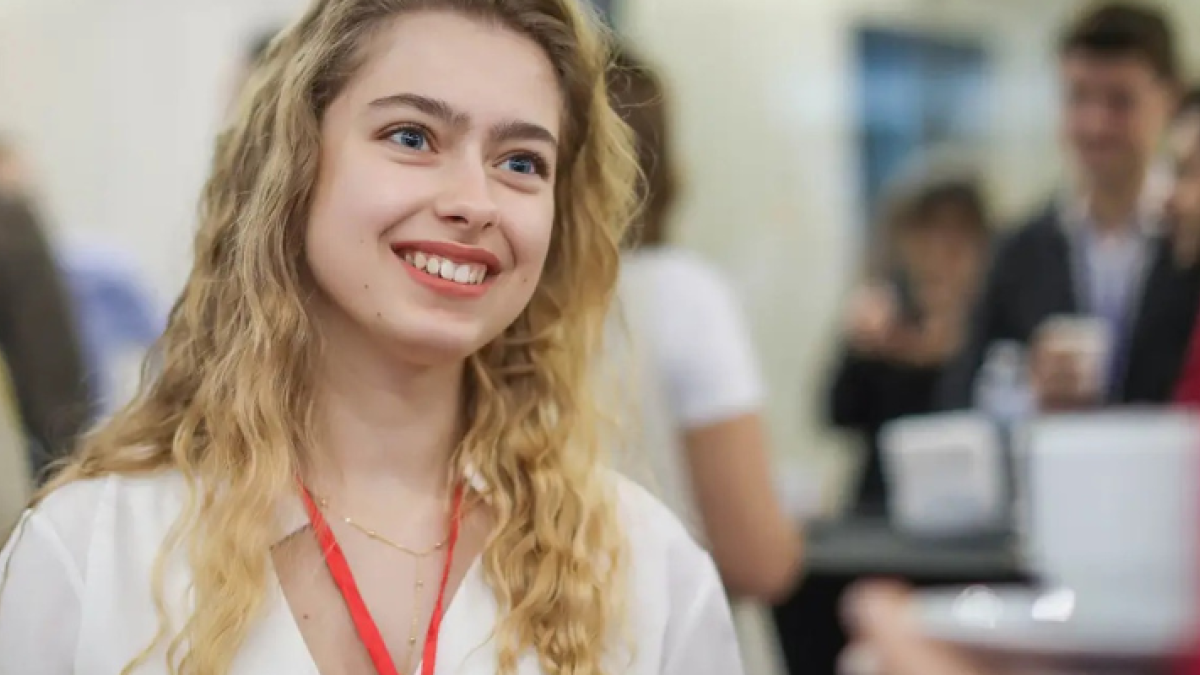Powered by ASU, American University Kyiv provides world-class education to Ukrainian students

An American University Kyiv student participates in networking event.
The American University Kyiv (AUK) has brought to fruition its commitment to provide a world-class education to Ukraine as students enrolled in five inaugural degree programs, including a Bachelor of Science in business administration, a Bachelor and a Master of Science in global management, and a Bachelor and a Master of Science in software engineering.
AUK, a member of the ASU-Cintana Alliance network, is the first university in Ukraine designed as a world-class institution with its foundation fully based on U.S. higher education standards and student expectations. It is also the first university in Ukraine to partner with Arizona State University, providing students with access to ASU curriculum, unique opportunities to participate in exchange programs and dual degrees from both AUK and ASU.
Students encountered these higher educational standards as early on as the admissions process. Along with meeting Ukrainian state guidelines and admission requirements, students were required to demonstrate high leadership potential through virtual presentations, interviews and essays showing their interest and commitment to the program.
“We are proud to be the first university in Ukraine to bring these features to the admissions process,” said Roman Sheremeta, founding AUK rector. “Throughout the admission process, we were highly impressed with the caliber of AUK’s applicants, as well as their commitment to learn, innovate and make a positive impact in Ukraine.”
Students currently enrolled at AUK are impressed with the faculty and staff’s commitment to their success and the benefits of attending classes that are uniquely designed to give them hands-on experience in preparation for a successful career.
“Studying at AUK is an entirely new experience for me. I admire the openness of the university's leaders, teachers and administrators,” said Vasyl B., a student enrolled in the global management master's degree program. “They are ready to help anytime and want to pass on all possible knowledge and experience to the students.”
Vasyl was also pleasantly surprised with the flexibility of his class schedule, which is allowing him to combine work and study effectively. He appreciates that his classes are giving him the practical skills needed for a successful career in the future.
“In other universities, it's standard practice for students to spend the majority of their time learning theory and doing little or no practical work,” said Daria V., a student in the software engineering bachelor's degree program. “The contrary is true in AUK. Here, you get a lot of experience that helps you gain confidence and an understanding of how to apply all of the knowledge you learned at the university to real-world situations.”
Currently, classes are being administered online. As soon as it is safe for faculty, staff and students to be present on campus, AUK plans to initiate in-person classes on its flagship Kyiv RiverPort campus, which was designed and renovated to provide a true American higher educational experience to its students.
“We are excited about the role that AUK will play in developing the skills that future Ukrainian leaders will need in order to rebuild and shape the future of their country,” said Rick Shangraw, founding president of AUK and Cintana Education. “It’s been inspiring to watch the commitment and resilience shown by AUK faculty and staff, and we look forward to the future success of our students and community.”
By offering students the best academic experience in the region through its close collaboration with ASU, AUK is believed to play an important role in the rebuild of their country.
“I had the privilege of meeting members of the AUK leadership team and faculty in Kyiv in June 2021 and was impressed by the vision they had for their academic community,” said Nancy Gonzales, executive vice president and university provost at ASU. “I applaud their spirit and unyielding support of their students as they successfully launched classes this fall in the face of enormous challenges. ASU stands with our colleagues in Kyiv and is a proud partner to the AUK community in its goal of providing a world-class education to the future leaders of Ukraine.”
More Local, national and global affairs

Higher education key to US competitiveness, security
ASU President Michael Crow’s notion of universities as public service institutions — places that serve society in practical and…

Military program leaders learn about breadth of ASU's defense-focused initiatives
Arizona State University seeks to be the U.S. military’s top partner in strategic learning and innovation. To advance this vision…

Expert discusses America's place in outer space with ASU students
If you asked Esther Brimmer about what security issue the United States should focus on next, she might say the moon. In fact,…

